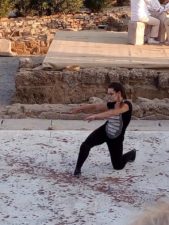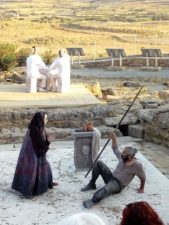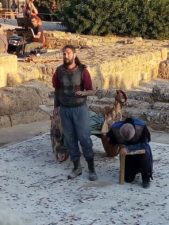A few words about the play
It was the dawn of the new millennium and I was finishing my novel, The Angel of the Ashes, which as I have said is my favorite and my life's verification. The Homeric verse about the Sun who, furiously said: "I will go down to Hades to bring light to the dead", was troubling me the whole time I was writing it as well as the "geography of Hades" that revealed to me misty paths to an untrodden place, in the "geography of the soul".
It is strange how some situations are born within us from the strangest associative. At that time I was experiencing a sense of defeat. I had also written an article for the New Year's Eve tribute of Kathimerini newspaper entitled "We are the defeated of the gods". I lived the concept of defeat at all levels - existential, metaphysical, human. And to my mind, it was not a feeling of collapse but, on the contrary, a creative feeling, being defeated by humans or gods, which had within it greatness, a profound dignity, and finally a liberating power.
At that time a Marguerite Yourcenar text about the defeated Hector fell into my hands and I read it with immense interest. The great writer gave flesh and bone to the concept of defeat that tormented me. Hector was the beautiful defeated of the gods.
The gods loved him so much that dragged him into the utter distress of a humiliating death so they can "mourn him with tenderness".
M.L.P. summer 2009
Plot
The play Hector, beloved by the Gods (Second writing, 1996) is a one-act play in three frames. In the play, the hero of Troy, having experienced an atrocious death and while all Troy mourns his death, comes back to life for a day. At the end of it, Hector will move on to the underworld, finally and irrevocably. In the meantime, he recounts his short life: he realizes the betrayal of the gods, the fact that he was a plaything in their hands, one of "earth's defeated", though beloved by them. He realizes that the defeat, though painful, made him stronger against the gods and humans and that he was liberated. In the few hours left, he realizes that the only thing worth is love, as it is the antidote to death. He, therefore, asks that he live these last moments with his wife Andromache and his son Astyanaktas. Close to him is a WOMAN and a MAN, while his father drags the chariot that takes him to the city of Troy, so he can be buried with honor as it befits a hero. Eventually, Hector meets the dead Astyanactas, and while his lament reaches a climax, he continues the long journey of a soul "out of time".
Archives
The play was staged at the Ancient theatre of Hephestia in Lemnos at the end of the international archeological conference on 15 September 2019 by the theatrical group of MEAS LEMNOS. (trailer)
Η παράσταση στο αρχαίο θέατρο Ηφαιστίας Λήμνου “Έκτωρ, ο αγαπημένος των θεών” καλοκαίρι 2019
Έκτωρ, ο αγαπημένος των θεών, στο αρχαίο θέατρο της Ηφαιστίας, λίγα λόγια απο την συγγραφέα



